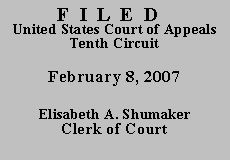

| ORVILLE TUCKER, |
|
| v. | |
| R. WILEY, Warden, |
I. Background
Tucker is incarcerated at the United States Bureau of Prisons in Florence, Colorado. Through his § 2241 petition, Tucker challenges a prison disciplinary proceeding that resulted in his loss of good-time credits after he allegedly set fire to his prison cell. Tucker raises one claim asserting that his constitutional due process rights were violated when the disciplinary hearing officer (DHO) found him guilty without sufficient evidence. Specifically, Tucker says he neither admitted to nor pleaded guilty to the charge, and there is no photo or video evidence linking him to the act. Tucker asks that the findings of the DHO be reversed and his good-time credits be returned.
II. Analysis
We review de novo the district court's denial of a § 2241 petition. Grossman v. Bruce, 447 F.3d 801, 804 (10th Cir. 2006). Federal inmates such as Tucker have a liberty interest in good-time credits. Brown v. Smith, 828 F.2d 1493, 1494 (10th Cir. 1987) ("18 U.S.C. § 4161 creates a right to good time credits and a deprivation of that right is a deprivation of liberty.")
When official punishment implicates a liberty interest, prisoners are entitled to some due process protections in their prison disciplinary proceedings. They are not, however, entitled to "the full panoply of rights due a defendant" in a criminal prosecution. Id. at 805 (citing Wolff v. McDonnell, 418 U.S. 539, 556 (1974)). We agree with the district court's conclusion that Tucker was granted all of the due process protections he was due and that his claim, therefore, is without merit.
The Supreme Court has held the following to be prerequisites of adequate due process in a prison disciplinary hearing: (1) the prisoner must be provided with advance written notice of the charges; (2) the prisoner must have an opportunity to call witnesses and present documentary evidence if doing so would not compromise institutional safety or correctional goals; and (3) at the close of the proceedings, the prisoner must be provided a written statement setting forth the reasons for the fact finders' decision and the evidence on which they relied. Wolff, 418 U.S. at 56366. See also Fogle v. Pierson, 435 F.3d 1252, 1259 (10th Cir. 2006). In addition, due process requires at least "some evidence" to support any sanctions that are ultimately leveled against the prisoner. Superintendent, Mass. Corr. Inst. v. Hill, 472 U.S. 445, 454 (1985); Wilson v. Jones, 430 F.3d 1113, 1117 (10th Cir. 2005).
Tucker only takes issue with the final due process requirement referenced above, arguing prison officials lacked sufficient evidence to strip him of his good-time credits.
Ascertaining whether [the some evidence] standard is satisfied does not require examination of the entire record, independent assessment of the credibility of witnesses, or weighing of the evidence. Instead the relevant question is whether there is any evidence in the record that could support the conclusion reached by the disciplinary board.
Hill, 472 U.S. at 45556; Jones, 430 F.3d at 1124.
The evidence on record in Tucker's case is certainly adequate to meet this standard. For example, he attached the following Incident Report to his § 2241 petition:
On 10/22/04 at approx. 6:45 p.m. the B lower fire alarm went off. Upon arriving at cell 03-107, occupied by inmate Tucker, a fire consisting of government clothing, and bedding tied to the inner grill was discovered. The sprinkler system had been activated flooding cell 307. The TV, all government clothing and bedding, government books, and the paint on the walls were all damaged. Inmate Tucker broke apart his four food trays into numerous pieces. Operations Lt. responded and extinguished the fire using a unit fire extinguisher.
Petition at Ex. C. Similarly, the Discipline Hearing Officer Report attached to the petition notes that Tucker submitted a written statement admitting the charge. Petition, Ex. B at 1. Finally, the Officer Report provided to Tucker after the hearing stated that the DHO relied on the following evidence in reaching their decision: (1) the reporting staff member's statement; (2) Tucker's oral and written statements; (3) a memorandum from another staff member corroborating the statement of the reporting officer; and (4) the cost-center manager's estimate of what repair and replacement would cost. Petition, Ex. B at 23.
Accordingly, we reject Tucker's claim that he was denied due process in his prison disciplinary hearing on the basis that officials lacked evidence for their finding of his guilt.
III. Conclusion
For the reasons set forth above, we deny Tucker's petition for § 2241 relief and DISMISS this appeal. In addition, we DENY his request to proceed in forma pauperis as we conclude that his appeal is not taken in good faith.
Entered for the Court
Timothy M. Tymkovich
Circuit Judge
*. This order and judgment is not binding precedent except under the doctrines of law of the case, res judicata and collateral estoppel. It may be cited, however, for its persuasive value consistent with Fed. R. App. P. 32.1 and 10th Cir. R. 32.1.
2. After examining the briefs and the appellate record, this three-judge panel has determined unanimously that oral argument would not be of material assistance in the determination of this appeal. See Fed. R. App. P. 34(a); 10th Cir. R. 34.1(G). The cause is therefore ordered submitted without oral argument.